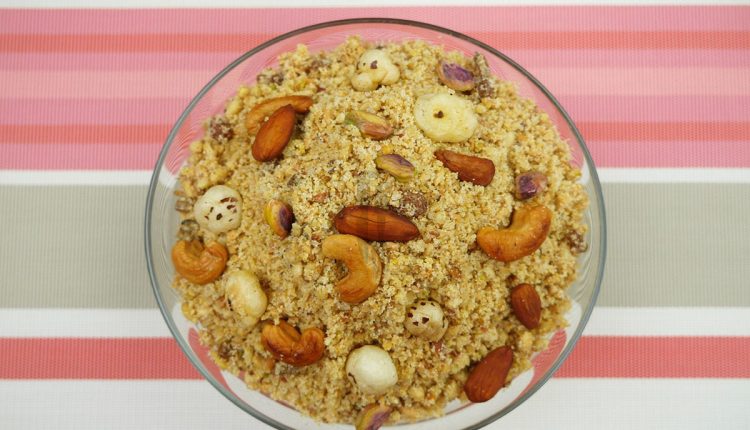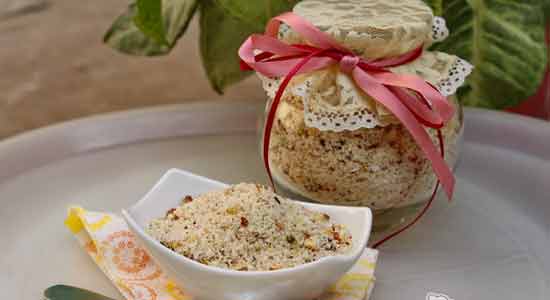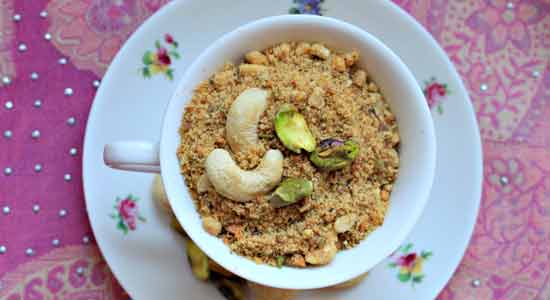
Panjiri Benefits and Recipe
If you have never had the chance to eat panjiri you are certainly missing out on a great traditional dish. It is made nearly in every desi house. Panjiri Benefits are vast and thus, known as a cure to basically all the diseases, which is most probably a myth but might work. Apart from all the benefits that it has, it is really yummy

Panjiri can be stored in an airtight box for a long time. You can use it as a snack and also as a traveling food. Diabetic and patients with cholesterol should avoid ghee and sugar. They should replace the sugar with dates or any other natural sweetener. It is better to eat it during winters, because it has a warm nature and requires a lot of water intake. Panjiri Benefits are mostly due to the nuts and fiber present in it. Following are a few benefits that you need to know about Panjeeri
- Panjiri is known as a traditional healing food for mothers. They should eat it right after giving birth, because their bodies require a lot of energy. The ingredients used in panjiri can help the mothers regain their strength and provide them with nutrients, which are essential to breastfeed.
- Panjiri promotes the flow of breast milk.
- It provides energy and cures postnatal depression.
- Panjiri helps get the uterus back to its normal self after delivery and removes the excessive fluid in the uterus.
- It contains healthy ingredients thus, can be used as a snack without the fear of harming your body in any way.
- Panjiri is known to increase the immunity of our body and thus, cures common colds that one catches in winters quite easily.
- It keeps your body warm from inside.
- Panjiri generates heat inside the body which is used by our body to heal it from inside, so it is really beneficial for people who have any sort of a wound especially mothers right after giving birth.
How to Make Panjiri

Although panjiri recipes vary depending on the season and the preferred taste, here is an easy way of making it.
Ingredients:
- Wheat flour: ½ cup
- Coarse semolina (Sooji) ½ cup
- Unrefined cane sugar: ½ cup
- Cashews (Caju): 15 ground to a coarse powder
- Almonds (Badam): 15 ground to a coarse powder
- Pistachios (Pista) 15 ground to a coarse powder
- Raisins (Kishmish): 15
- Desi ghee: 4 tbsp.
- Melon seeds: ½ cup
- Makhana ¼ cup
- Arabica gum (Gond): ¼ cup
- Coconut oil: ¼ cup
- Dried coconut: ½ cup
- Cardamom seeds: ½ tsp.
- Ginger powder: 1 tsp (Optional)
- Kamarkuss: 2 tbsp. (Optional)
Method:
- Grind ½ cup of sugar.
- Take ½ cup of whole-wheat flour and ½ cup sooji in a non-stick pan or a wok.
- Roast them on a low flame (prevent burning). Roast till the color changes.
- Add dried coconut and coconut oil to the flour.
- Gradually add ghee and stir.
- Roast almonds (ground) separately and then add them along with cashews (ground) to the flour and coconut mixture.
- Cook the mixture till you are sure that it does not give a raw taste.
- Grind the gond and makhana (separately) to coarse powders and add in. You can also add kamarkuss if you want.
- It will slowly form crystals but keep on stirring.
- Add in cardamom and ginger powder.
- Roast melon seeds separately and then add them to the mixture.
- Turn off the flame and add powdered sugar to the panjiri mixture and then add raisins.
- Mix it well.
- The consistency depends on your choice. Add a bit of butter to it if you want to make it a paste or keep it thick and serve as energy bars.
- You can also stir a tablespoon in a glass of milk or just eat it as a treat.

